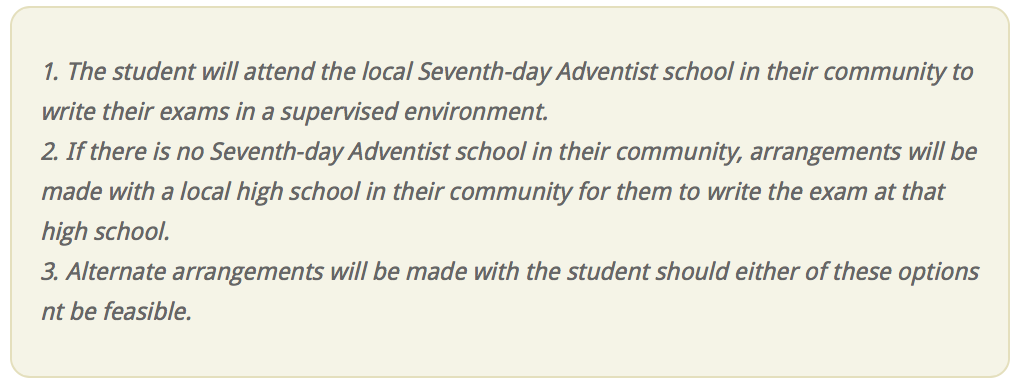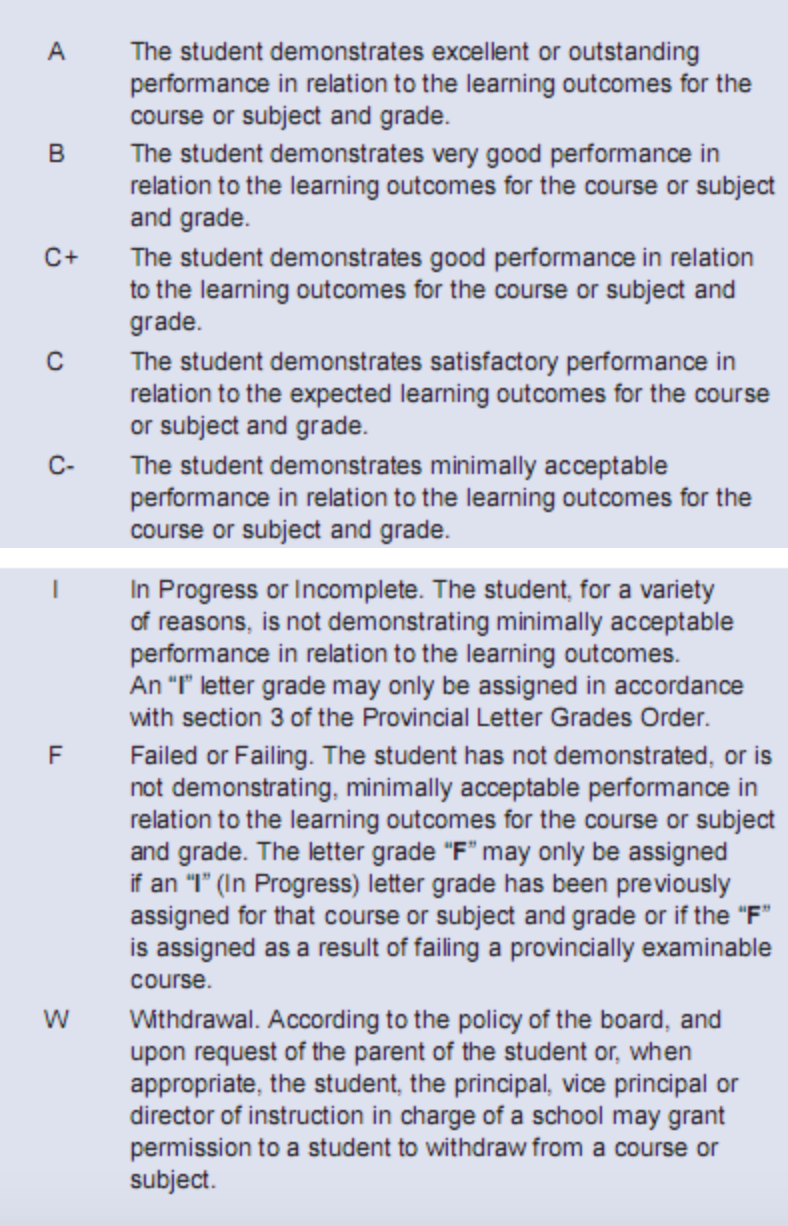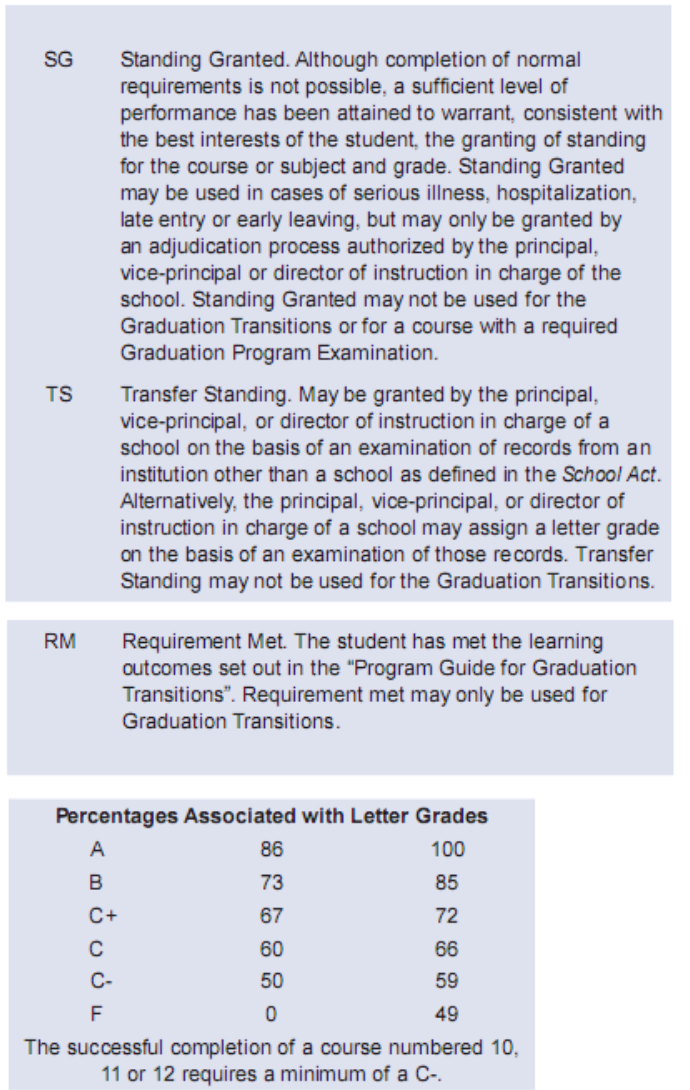General Information
Testing
Provincial Exams
Academic Dishonesty
Assignment and Assessment Retakes
Course Challenge Policy
Course Withdrawal Policy
Home Schooling
Grading System
The school follows curriculum guidelines established by the B.C. Conference of Seventh-day Adventists and in harmony with the requirements set by the B.C. Ministry of Education.
The Seventh-day Adventist, North American Division Department of Education, develops Reading, Bible, and Science/Health curriculums used. Other courses offered by WCAS follow the British Columbia Ministry of Education guidelines from a Christian perspective.
WCAS recognizes the importance of testing for the student and the school. With this in mind WCAS participates in the following achievement tests and other tests as required from time to time.:
- CAT-3 (Canadian Achievement Tests, Version 3) –Winter- Grades 3-8
- FSA (Fundamental Skills Assessment)-Spring- Grade 4 and 7 The FSA tests as designed by the Ministry of Education are required and it is expected that all students in the affected grades will participate. Contrary to reports in the media the FSA are not optional.
Students in Grades 10-12 participate in the Provincial Examination program as required by the BC Ministry of Education. Arrangements will be made in one of the following ways for students to be able to write the Provincial Exams for the courses in which they are enrolled.


This program is based on an element of trust, as assignments are completed at a distance, without the teacher providing direct supervision. When students are taking a test, it is expected that parents will provide supervision to ensure the students are using only the materials and resources that the teacher is expecting them to use. As well, work that is handed in is expected to be the student’s own work. Teachers regularly check on the Internet to see if student work has been copied from other sources. In cases where the teacher finds that cheating has been taking place, the student will receive no grade for that assignment, will address the issue with the student and the parent, and will notify the administration this has happened. If there are recurrences of this practice, the student will be withdrawn from all courses with WCAS, and may not be allowed to re-register with the school in the future.
Assignment and Assessment Retakes
WCAS teachers are committed to providing excellence in DL education for all of their students. In the spirit of mastery-based learning, WCAS does offer students the opportunity to repeat assignments and assessments as necessary. However, the assessment procedure must ensure that the results obtained are a fair and true reflection of the ability of the learner. For this reason, the following criteria must be met for a student to apply for a retake on an assignment or assessment:
- The student’s grade on the assignment or assessment must be less than 73%,
- the assignment must be free of any teacher suspicion relating to plagiarism or academic dishonesty (refer to the Academic Honesty Policy),
- the student must have less than 80% overall in the given course,
- and the retake request must be received by the teacher within five business days of receipt of the assessment or assignment results.
If the assignment or assessment meets the above requirements, the student may submit a request for a retake to the classroom teacher. The following policies will apply throughout the process:
- WCAS provides the opportunity for up to two resubmissions per assignment.
- WCAS provides the opportunity for one retake per unit test or major project.
- Students must submit the “WCAS Retake Application” form to be eligible to retake unit tests and major projects within five business days of receiving the initial mark.
The maximum grade a student can receive on a unit test or major project that has been retaken is 85%.
In cases where full-time WCAS students have demonstrated competency in a given subject area, it is possible that students can request to challenge a course. Students who wish to challenge a course are responsible to provide documentation of learning that satisfies the Ministry of Education curricular competencies. Contact with the adult who oversaw the learning (which cannot be solely a parent) and the teacher assigning the grade will need to be initiated and maintained, as well. Whether the curricular competencies have been satisfied will be at the discretion of the teacher. Additional proof of student learning may be required by the teacher. In this case, the student will not be assigned the grade until the requested documentation has been submitted. WCAS Students are not permitted to take Bible courses, or any other Board Authority Authorized course, as challenged credit. All WCAS students are required to take Bible as a live class.
A student can challenge a course if he or she:
- Has not already challenged the course and received a passing grade, or completed the course through previous enrolment, or been granted equivalency for the course.
- Can give compelling evidence that he or she will succeed in the challenge.
Challenge Process
The challenge process begins when it is determined that credit cannot be awarded through equivalency and a student has given compelling evidence that he or she will succeed in a challenge assessment.
To receive credit for a course that does not have a required exam, a student must:
- Obtain at least a C- (50% minimum) grade/score in the challenge course assessment. This course assessment is created by WCAS teachers and staff, and generally consists of a mid-term exam and final exam in core academic courses. In certain electives other criteria will be used to determine competency of the course curricular competencies at the discretion of the course teacher.
To receive credit for a course that has a required exam, a student must:
- Complete the challenge process through the school and have a passing school percentage reported to the Ministry; and
- Write the provincial exam at one of the scheduled exam times set by the Ministry; and
- Obtain a final mark in the course of at least a C- (50% minimum) based on the combination of school mark (based on the challenge) and exam mark. The minimum passing score is the same as for students enrolled in the course.
Students who enroll in a course should do so with the intention of completing within a year of the active date. However, there may be times when it becomes necessary for a student to withdraw from a course for a variety of personal or academic reasons. If this happens before the student becomes active from the course, the course will simply be removed from the student’s timetable and will not be posted to the student’s transcript. However, in a case where the student is already active in a course, the course will be posted as “Withdrawn” (noted by a “W”) on the student’s Ministry of Education Transcript of Grades.
**Please note that if you withdraw from a WCAS course you will be unable to retake the course until two funding periods have passed. You can check with the office on when that might be.**
Students can make a request to be withdrawn from a course by writing an email to the WCAS office manager (office@wcasdl.ca). This request will be forwarded to the course teacher for consultation and confirmation. In the case where students have completed more than 80 percent of the course as determined by the teacher, students will not be permitted to withdraw. Students will be given the opportunity in those cases to choose one of the two options:
- Complete the remainder of the course, including any requested proctored or final exams
- Take a ‘zero’ for any remaining outstanding assignments or proctored exams, and a final grade will be submitted.
Teacher or Grad Advisor Requested Withdrawal
Teachers or Grad Advisors can make a request for a student to be withdrawn from a course in the following cases:
- Students communicate directly the request to be withdrawn.
- Students have been enrolled in the course for a year or more and no plan to complete is in sight. Communication must be sent to the student, as well.
- Students are not responding to communication about course work for more than 8 weeks.
Please note, that the withdrawal policy (not being able to start a course again for a minimum of 2 funding periods) applies in these situations as well. As such, if a student reaches out afterwards and wishes to complete the remainder of the course, administration will reach out to the teacher to confirm re-opening the student’s course.
Christian Home Schooling is a growing concept and one that the Board and Administration of WCAS recognizes. At this particular time, we are not accepting registrations from Home School Students. WCAS recognizes the potential of distributed learning for home school students but we are not yet equipped to serve these families.
In keeping with the Ministry guidelines for reporting student progress WCAS reports progress differently a various grade levels.
In the early years student progress is reported in the context of what can be expected from children at that particular level of learning and development. The categories that your will see in reports cards and other communication will compare a students progress compared to students generally at that level. As students approach the end of the school year most will be “Meeting Expectations” while very few would “Exceed Expectations”. The instructors will be able to communicate ways your can support your child’s learning and will be ready to discuss this with you informally as well as including this kind of information in formal report cards.
Provincial regulations for reporting student progress require that parents or guardians be provided with a minimum of:
- three formal written report cards (December, March and June). The formal written report follows the requirements for the specific grade and program as stated in legislation and policy. One formal report shall be made at the end of the school year. Formal reports identify student progress and are placed in the Permanent Student Record file.
- three informal reports each school year (October, February and May). At least three informal reports must be provided to parents each school year.
High School students will receive four formal written reports (November, February, April and June) and four informal reports (October, December, March and May) each school year.
Formal Reports
Formal reports communicate to parents and students significant aspects of the students’ progress in the areas of intellectual, social, human and career development.
Performance Scale
The performance scale for Primary students indicates, in words or as a graph, the student’s level of performance in relation to the expected learning outcomes set out in the provincial curriculum for each subject and grade
For Grades K to 9, performance is described as one of the following:
• Not Yet Meeting Expectations
• Approaching Expectations
• Meeting Expectations
• Exceeding Expectations
Use of the performance scale to show progress in language arts (including reading, writing, and speaking/listening), mathematics, social studies and science is mandatory. The performance scale may also be used to report progress in other areas, such as fine arts, personal planning, physical education, social responsibility and work habits.
Letter Grades
Criterion-referenced letter grades in Grades 10 to 12 indicate students’ level of performance in relation to the prescribed learning outcomes set out in provincial curriculum guides for each subject or course and grade, and the learning outcomes for board authorized courses and independent directed studies. Letter grades must be included on report cards in Grades 10 to 12.


The following may be used on final reports in Grades 4-12.


